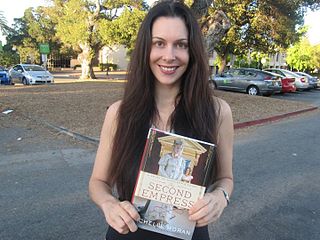A Quote by Michelle Moran
...she refused to leave anything to someone else that she could do better herself.
Related Quotes
She stared at herself in the mirror. Her eyes were dark, almost black, filled with pain. She'd let someone do that to her. She'd known all along she felt things too deeply. She became attached. She didn't want a lover who could walk away from her, because she could never do that - love someone completely and survive intact if her left her.
She emptied herself of Fabio and of herself, of all the useless efforts she had made to get where she was and find nothing there. With detached curiosity she observed the rebirth of her weaknesses, her obsessions. This time she would let them decide, since she hadn't been able to do anything anyway. Against certain parts of yourself you remain powerless, she said to herself, as she regressed pleasurably to the time when she was a girl.
She imagined herself both queen and slave, dominatrix and victim. In her imagination she was making love with men of all skin colors--white, black, yellow--with homosexuals and beggars. She was anyone's, and anyone could do anything to her. She had one, two, three orgasms, one after another. She imagined everything she had never imagined before, and she gave herself to all that was most base and most pure.
although she went home that night feeling happier than she had ever been in her short life, she did not confuse the golf course party with a good party, and she did not tell herself she had a pleasant time. it had been, she felt, a dumb event preceded by excellent invitations. what frankie did that was unusual was to imagine herself in control. the drinks, the clothes, the instructions, the food (there had been none), the location, everything. she asked herself: if i were in charge, how could i have done it better?
He felt safe with her. He'd never been safe with another human being, not since he'd been taken as a child from his home. He'd never been able to trust. He could never give that last small piece - all that was left of his humanity - into someone else's keeping. And now there was Rikki. She let him be whatever he had to be to survive. She didn't ask anything of him. There was no hidden motive. No agenda. Just acceptance. She was different - imperfect, or so she thought - and she knew what it was like to fight to carve out a space for herself. She was willing for him to do thar.
And now she was back in the world, not one she could make, but the one that had made her, and she felt herself shrinking under the early evening sky. She was weary of being outdoors, but she was not ready to go in. Was that really all there was in life, indoors or out? Wasn't there somewhere else for people to go?


































